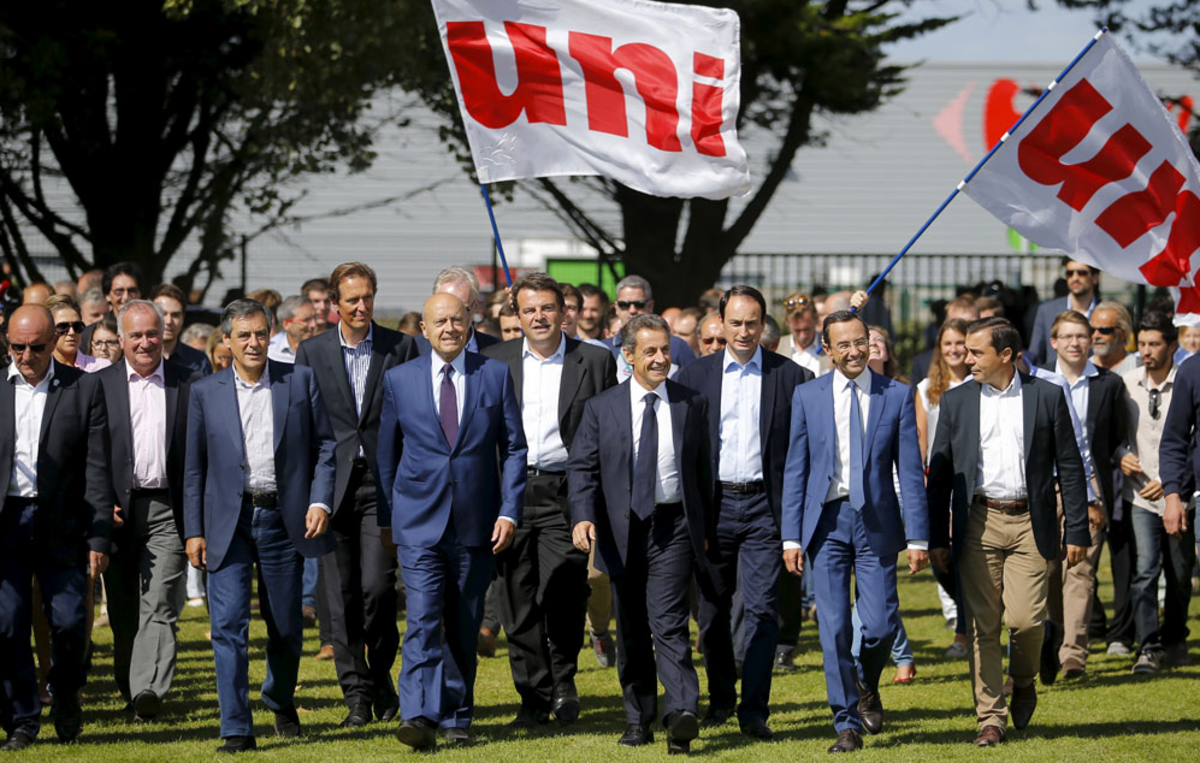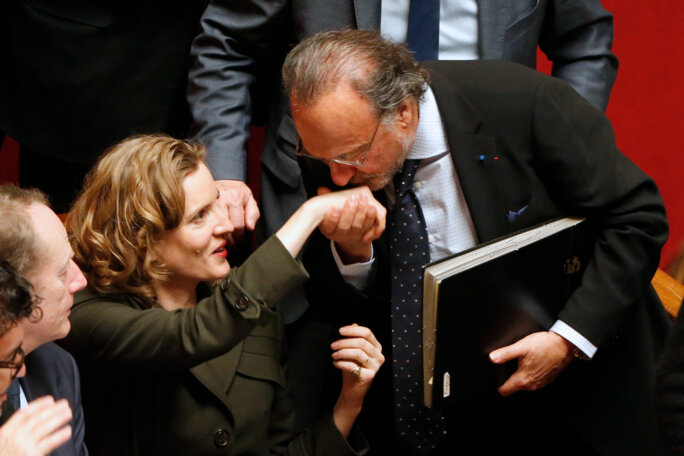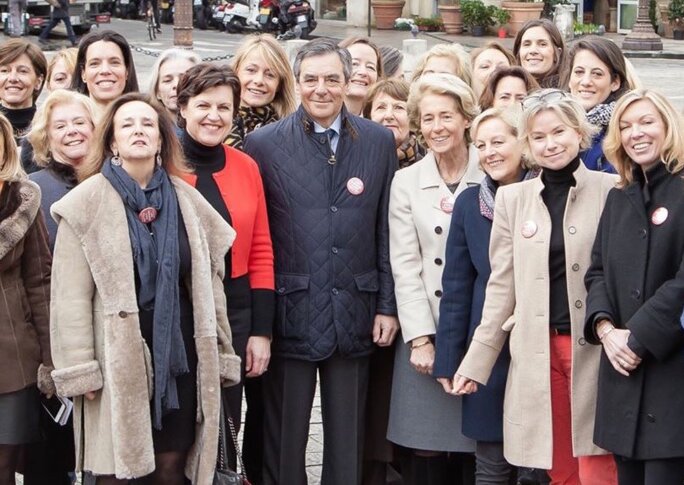There was something more than a little incongruous about Nicolas Sarkozy’s declarations at the conservative Les Républicains party congress in the north-western coastal resort of La Baule earlier this month, when he claimed that the party’s militants are “the only ones who today defend to the letter the equality between man and woman”.
The former president, 61, who in 2014 became leader of the party (then called the UMP, renamed last year Les Républicains) and who stepped down in order to run in the party primaries to decide its candidate in next year’s presidential elections, spoke of the “combat that was that of women’s emancipation” and asked “where are the feminists when the burkini is nothing other than to lock women up in a prison of clothing?”.
The most incongruous aspect, that Sunday on September 4th, was that his close guard, sat behind him, loyally applauding his speech, was made up of eight men and not a single woman.
There is only one woman, Nathalie Kosciusko-Morizet, standing against Sarkozy and six other candidates in the party’s primary elections to be held in November. She struggled to scrape together the minimum number of endorsements, demonstrating once again the conservative Right’s incapacity to bring women to the fore of the party. Already, the party pays a yearly fine of 3.5 million euros as the penalty for not meeting the legally-required 50-50 gender parity in candidates it fielded during the 2012 parliamentary elections. There were just 129 women among its total of 506 candidates to become Members of Parliament (MPs), representing 26%, and which resulted in a total of 28 women MPs elected under the party banner (representing 15% of those sitting in parliament's lower house, the National Assembly).

Enlargement : Illustration 1

Since 2014, the financial penalties meted out to parties which failed to respect the June 2000 law were doubled, and to avoid a crisis in its finances the Républicains party has this year begun a drive to include more female candidates for next year’s parliamentary elections, to be held in June, one month after the presidential poll. The problem is a vast one, because the party habitually sends sitting MPs back into the new election campaign, and the huge majority of these are men. As a result, most of the female Républicains party candidates next year will be sent to fight for constituencies where the party must unseat its opponents, including those that are difficult, even impossible, to win over and which, in the jargon, are called “conquest constituencies”.
The party’s primaries will include a TV debate between the candidates broadcast by the TF1 channel on October 13th, and which will be a lineup of suits and ties save one, Nathalie Kosciusko-Morizet. “I think a debate in which there are five, six, seven men is not a furious indication of modernity,” said Kosciusko-Morizet, 43, in an interview with BFM TV on September 5th.

Enlargement : Illustration 2

In a straw poll of Républicains party militants of both sexes present at the congress in La Baule on September 3rd and 4th, most concurred that being a woman was not a reason to be given special favours, but there was broad agreement that the issue of parity justified proper discussion. The party only rarely concerns itself with women’s rights, save for occasions like the International Women’s day, on March 8th, when it held a debate, issued a statement in support of the campaign for equality, and issued similar messages on social media.
During her interview on BFMTV, Kosciusko-Morizet said that the question of female representation was not the “principal argument” she wanted to present in her candidature, but added that “the difficulty in including women is a new illustration of the ‘between ourselves’ [mentality]” in French politics. Meanwhile, Éric Woerth, a former budget minister and later labour minister under Nicolas Sarkozy’s government, defended the party’s record by claiming “there are lots of women” who are involved in the teams surrounding the party’s presidential hopefuls.
The issue of parity in politics is a longstanding one, and not limited to the situation of the Right. But its poignancy for the conservatives now is that the candidates in the Républicains party primary elections have, indirectly, placed women’s rights on their agendas. Not so much in relation to questions such as unequal pay or other discriminations, but above all over the issue of Muslim women’s clothing – the burkini, the headscarf, the veil. One of the primary election candidates, Bruno Le Maire, 47, took to the stage at La Baule to declare that "in France, women are visible, women are visible, and they don’t have the calling to be hidden”. There was apparently no irony intended in the comment despite the fact that just three out of the 30-odd people chosen to speak on stage at the congress were women.
'I comment world affairs, serious things, not women’s stuff'
Most of the primary candidates view the emancipation of women above all through a focus on French identity, and very few propositions have emerged beyond that angle. In the party’s official policy project, adopted by its national council in July, only two chapters concern gender equality, contained in a section on “family affairs policies”. These propose “to favour the professional activity of women by developing home aid jobs” and the need “to rethink our policy towards childcare and types of childcare services”.

Enlargement : Illustration 3

A number of Républicains party militants speak of the difficulties in putting forward to the electorate of the Right issues other than economic performance and public security. Over time, prejudices have become entrenched, and many right-wing politicians apparently fail to realise to what extent their expressed views are profoundly patriarchal, for example when they argue that behind every woman wearing a veil is a man, therefore dismissing that any of the women concerned might be exercising their free choice. Beyond this, the demarcation lines have become so blurred that Luc Chatel, conservative MP and former minister under Sarkozy, has sounded tribute to the liberating effects of the mini-skirt among other symbols of emancipation attached to the 1968 student revolts – the political heritage of which Sarkozy himself has said should be “liquidated once and for all”.
The controversy that raged in France this summer over the burkini provided glaring examples of the corruption of feminist arguments. Lionnel Luca, Républicains party MP and mayor of Villeneuve-Loubet, a small town on the French riviera, where he introduced a ban on the wearing of the burkini on local beaches, issued a statement via Twitter explaining that “clothing confinement always [preceeds] their definitive confinement outside of society”. After the French council of State ruled that the numerous burkini bans announced this summer (mostly by conservative mayors of coastal towns in south-east France) were illegal, leading to the annulment of most of the prohibitions, Républicains party MP Pierre Lellouche vented his outrage at a decision that gave “reason to the Islamists who want to place their women in submission”.
In May, Lellouche was asked to comment on a joint investigation by Mediapart and France Inter radio which revealed how Green party MP and deputy speaker of parliament Denis Baupin was accused by several women of numerous and grave incidents of sexual harassment and assault, he answered: “I comment on international affairs, the serious things, not on women’s stories.”
To coin Nicolas Sarkozy’s question, where were all the feminists when the women recounted their humiliating experiences with Baupin? With few exceptions, the conservative Right kept silent when the revelations were first published. “The code of silence is not among the political class, it’s with the Greens that there was a problem,” declared the head of the Républicains MPs' parliamentary group, Christian Jacob. But the refusal to see the Baupin affair as an illustration of a wider problem of sexual harassment in political life was not limited to men of the Right. The Républicains party spokeswoman, Valérie Debord, claimed that within her party “this sort of thing doesn’t exist, if a man steps out of place he is talked to, and it stops”.
The opportunity to reposition feminist issues within the context of ethnic and religious identity is a godsend for those who seek to put Islam and secularism at the heart of the presidential election campaigning. It is also a feat of singular hypocrisy given the record of the Right. During Sarkozy’s five-year term of office as president, from 2007-2012, the progress in reducing gender inequalities is paltry, if not virtually non-existent. While he once promised that equal wages for men and women would become “total in 2010”, at the end of his presidency women on average were paid 25% less than men in the same job.
There was, certainly, the so-called Copé-Zimmermann law of January 20111 which required the boards of directors of France’s largest corporations - those listed on the CAC 40, the country’s principal stock market - to include a minimum 20% representation of women (rising to 40% in 2018). That was followed by a bill of law to impose gender quotas in the upper echelons of the civil service. But the executive boards and governing councils that make up the most important decision-making entities were not concerned by the legislation. Above all, however symbolic such initiatives were, they in fact concern very few numbers of women, and do next to nothing to prevent the perseverance of gender, and social, inequalities.
-------------------------
- The French version of this article can be found here.
English version by Graham Tearse


